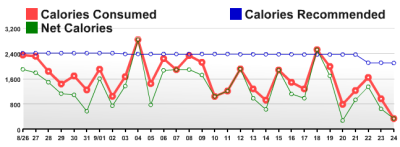Garbage Out
As further evidence of my late onset OCD (see Bubble Timing), I've recently picked up a new obsession: tracking nutrition. (At this point, anyone who knows me is probably assuming this blog has been hijacked.)
It started with a general feeling of out-of-shapeness. The long hours of graduate school (plus working full time, touring, etc ...) had taken their toll on my health, and I was looking a bit, er, round in the middle. I do exercise (I run regularly) but it wasn't noticeable. For a tall skinny kid who used to down entire pies without a blip on the scale, my early-30s were a shock of actually being, you know, human.
That's when I picked up a book called The End Of Overeating:

Written by David Kessler (former FDA commissioner), it explains why we learn, over a lifetime, to compulsively eat larger amounts of fat, sugar and salt than we need (hint: it's partly our biology, and partly "the man"). Long and short of it is, while we are conditioned to "hyper eat" as he calls it, you can do something about it.
About the same time, I found an iPhone app (with an associated web site) from Livestrong.com (Austin biking champ Lance Armstrong's company) called the Daily Plate. The idea is simple: you enter what foods you eat, and it automatically tracks the nutrition info: calories, fat, protein, carbs, vitamins, etc. They have a huge database of commercial and generic foods, so almost anything you might eat is already in there (and it's wiki-like enough that you can edit or add your own foods, too). It shows running totals and compares it to your goal:

This thought--that you could actually quantify the amount of energy you're taking in, versus what you're expending--was totally revelatory. My database-addled brain said, "I know how to do this."
So I started counting calories. My first revelation--I was on tour at the time--was that I was regularly eating upwards of 3500 calories a day. (The suggested diet for adults is between 2000 and 2500.) I also started to realize that I could actually predict my cravings and moods based on what I'd eaten in the previous 24 hours; for example, if I go without eating all day until dinner time, I desperately want to eat something fried and covered with cheese ("fat on salt on sugar on fat", as Kessler calls it).
So I changed how I eat. It was rough at first[1], but I'm actually really enjoying it now--I monitor and record everything I eat, and shoot for 1500 - 2000 calories a day. Drinking turns out to be the strongest predictor of going over my calorie limits (duh!) but now that I know that, I can at least plan for it a little better. In the month that I've been doing it, I've lost almost 15 pounds:

Next up: getting a body bugg! (Or a sub-dermal implant, whichever is cheaper.)
[1] - At one point, a band mate threatened to take away the solitary cheese stick I was allowing myself as a snack, and I almost cried. (I felt better after listening to some Indigo Girls and reading the Nanny Diaries.)


